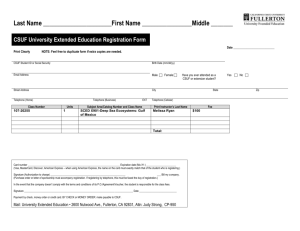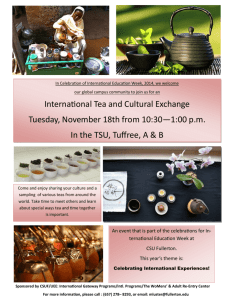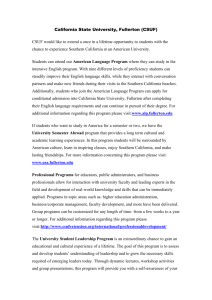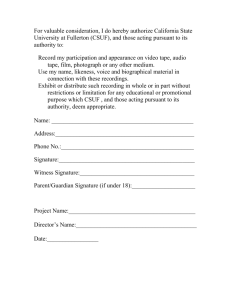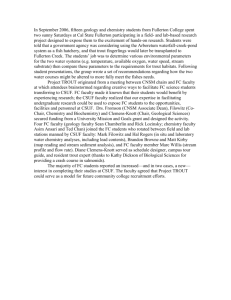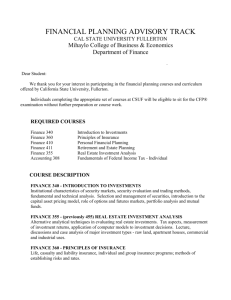Global Leadership Certificate - Hispanic Association of Colleges
advertisement
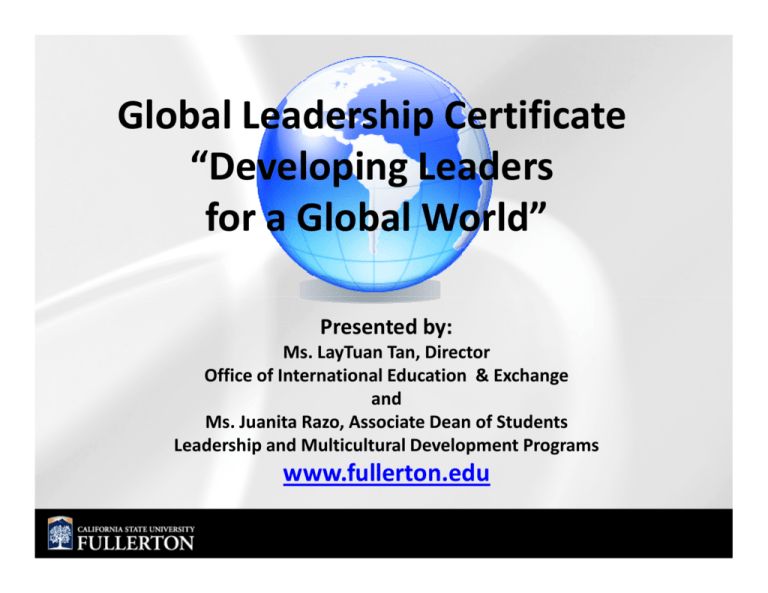
Global Leadership Certificate “Developing Leaders for a Global World” Presented by: Ms. LayTuan Tan, Director Office of International Education & Exchange and Ms. Juanita Razo, Associate Dean of Students Leadership and Multicultural Development Programs www.fullerton.edu Facts About CSUF • Located in North Orange County • Founded in 1957 • Institution Type: Public, 4-year higher education institution within 23-campus California State University system • Total enrollment: 35,590 (Fall 2010 data) • Programs: 103 degree programs offered, including 54 undergraduate, 49 graduate, and the Ed.D. • Tuition Fees: Annual fees for full time undergrads $4866 Cal State Fullerton Facts ( contd) student body (Fall 2010 census): • American Indian 0.4%, Asian/Pacific Islander 21.2%, Black 2.7%, Hispanic 30.2%, White 31.3%, Multiple Race Non-Hispanic 2.4%, Unknown 7.2%, International students 3.5% • Gender: 58% female • Average Age: 24 • Diversity of • Designated Hispanic Serving Institution International Data Fall 2010 Spring 2011 • 1236 international and exchange students from 79 countries around the world • Currently 73 study abroad students in 16 countries • 66 partnership agreements with 27 countries • 75 visiting faculty from 12 countries (for the past two years) Mission Statement of CSUF “California State University Fullerton is a comprehensive regional university with a global outlook” How is “Global Outlook” Defined? Mission Goals and Strategies statement: “to provide experiences in and out of the classroom that attend to issues of culture, ethnicity, and gender and promote a global perspective” How Do We Measure “Global Outlook”? •2 sets of outcomes: 1. Institutional outcomes 2. Student outcomes Institutional Outcomes 1. Total international and exchange students 2. Total study abroad students 3. Number and quality of international partnerships 4. Visibility of institution abroad Student Outcomes • Integrated activities (intentional) • Collaborative programs • Student learning outcomes intercultural competence skills global workforce preparedness global citizens Benefits: Global Leadership Education Prepares students for global workforce development Improves skill sets in leadership, intercultural awareness, organizational, decision-making, team-building, conflict resolution Interaction between domestic and international students Experiential component provides practical approach towards application of knowledge Program Overview The Templeton Guide: Colleges That Encourage Character Development: lists CSUF's Student Leadership Institute among "Exemplary Programs" in the student leadership category. CSUF SLI Overview • Co-curricular certificate-bearing program • Participation by choice • At least 2 semester participation • 20-30 hours commitment to earn certificate • Program philosophy: a) Everyone is a leader. b) Leadership can be learned. c) Leadership is about action and making a difference. Community College Partnership • Established partnerships: • Santa Ana College (SAC), 2000 • Santiago Canyon College (SCC), 2006 • Need: 1) Co-curricular leadership training program, 2) Expose students to leadership education, 3) Promote a pathway to 4 year institution. • Structure: 2 day conference model (University Leadership Track) • Inter-campus participation: Cross campus enrollment • Recognition: • End of the year Banquet (at CSUF) • CSUF Certificate of Completion 2009-10 CSUF SLI Program Stats Applicants: 498 Participants: 250 (certificate track) Training Sessions: 60/semester Certificates of Completion awarded: 207 2009-10 CSUF SLI Participant Profile •• Gender: 65% Female • Ethnicity: 41% API, 29.4% Hispanic • College participation: 38% BAE, 14.5% HSS, 11.2% HHD, 10.6% COM • Class Level: Upper division(60 or more units) • Participation trends: Increased involvement among graduate students and international students. CSUF Leadership Focused Tracks • Certificate Track Components •Advance application of • learning •Emerging to advance level positions Skill-building Workshops (required) Positional Leadership Opportunities (optional) Experiential Component (required) •50-65 skill-building workshops /semester •1hr – 2 hr in length •Volunteer trainers •Interactive •Theory to Practice •Dialogue •Learning by doing •Encourages involvement •Integration & reflection CSUF SLI Track Structure • • Global Leadership Track “Developing Leaders for a Global World” Global Leadership Track • Data on Student Participation • 14 students received certificates Spring 2010 • 50 students completed Fall 2010 workshops • Quotes and comments from participants’ essays: Student 1: “Through GLC workshops, I recognize that we all have stereotypes and generalizations about other people and races, but this should not affect the way we treat other individuals.” Student 2: “The workshops taught me how different cultures communicate differently. They helped me to learn to suspend judgment on others, perception checking and mindful interviewing.” Data on Student Participation Student 3: “The workshops made me question leadership styles outside of a capitalistic society. It was nice to be in a room where we could be clearer about our own culture and ethnicity that goes beyond the surface and have nothing to do with the color of skin.” Student 4: “GLC workshops have afforded me the opportunity to bond with people of like mind who are concerned about the world and the global community.” Global Leadership Certificate Learning Outcomes Learning outcome #1 Students will understand the concepts of culture, diversity and leadership from a global perspective Learning outcome #2 Students will define different intercultural communication styles Learning outcome #3 Students will apply global leadership and intercultural communication skills to campus and community activities Assessment of Program • A multi-level assessment project (a “work in progress”): (1) measures student learning outcomes – • Core workshop surveys on understanding concepts and definitions • Experiential component (reflective paper) on application of knowledge (2) measures program effectiveness Level 1 Assessment 3 core workshops measure specific student learning outcomes on: Understanding concepts of culture, ethnicity and leadership Defining intercultural communication styles Applying theoretical knowledge to leadership positions on and off campus Level 2 Assessment Program assessment goals: Address the question of effectiveness of Global Leadership Certificate track Use data to improve on content of workshops Sustain interest in program through effective marketing and promotion Methods of Assessment Multiple forms of assessment: a combination of qualitative and quantitative methods (role of StudentVoice) Likert-scale surveys for core workshops Reflective papers for experiential component Rubrics (both holistic and analytic) to synthesize and compile data for individual students’ essays and analyses of surveys “What Is Culture?” Core Workshop Survey Student learning outcomes: 1. Explain culture and how behaviors are affected by cultural values 2. Compare different cultural values e.g. American and non-American 3. Understand the challenges of transitioning and adjusting to a new culture 4. Apply strategies that will help them cope with adjusting to new cultures Likert Survey Questions On a scale of 1 – 5, please circle your responses to each question: 1=Strongly Disagree 2= Disagree 3= Neutral 4 =Agree 5=Strongly Agree The iceberg model as applied to culture helps me understand and explain beliefs, norms and values. 1 2 3 4 5 I can explain how behaviors are affected by different cultural values. 1 2 3 4 5 Likert Survey Questions There are no differences between Americans and non-Americans and culture is based on individual likes and dislikes. 1 2 3 4 5 If I read and learn about a new environment, I will not experience culture shock when I am in that new environment. 1 2 3 4 5 When I am in a new or unfamiliar environment, I am confident that I have the skills and strategies to cope. 1 2 3 4 5 Survey Data: Question 1 Results Survey Data: Question 2 Results Survey Data: Question 3 Results Survey Data: Question 4 Results Survey Data: Question 5 Results Experiential Component Requirements Two requirements for completion of certificate: 1. Participation in an activity (see Section D: Experiential Component for options) 2. A reflective essay to document above Essay prompt: How have you applied the concepts learned from the Global Leadership Track workshops in your experiential component? You must respond to the following: •What do the following terms mean personally to you: culture, or diversity, or global leadership? •Describe your communication style or leadership style in your activity. Rubric for Global Leadership Certificate Essay Improvement Needed At least 1 of the required questions is addressed but no details are offered. Moreover, ideas are not clearly expressed. Basic At least 1 of the required questions is answered, and demonstrates that some knowledge is gained. Ideas are somewhat clear, but there is a need for more supporting information. Intermediate The required questions are answered and it is evident that the answers offer support to knowledge gained. Ideas are clearly expressed, but the supporting information is general. Advanced The required questions are answered and offer detailed information. Ideas are supported by detailed evidence of understanding of terminologies and application of skills. Challenges Ensure sustainability Sustain interest with adequate promotion and marketing strategies On-going evaluation and assessment Improve workshop content by including new components Future Potential Collaborate with other colleges besides College of Education: MBA leadership program, graduate nursing students Introduce new kinds of data collection e.g. interviews with participants to obtain personal perspectives of program participation Implementation Considerations Shared resources (e.g. ISO and MLC/Leadership programs) for promotion, marketing, presenters Collaboration in curriculum writing for workshops – involving faculty Staffing - building a culture of assessment On-and-off campus funding resources e.g. grants Relevant CSUF Web Pages www.fullerton.edu www.fullerton.edu/international www.fullerton.edu/deanofstudents www.fullerton.edu/sli QUESTIONS? [“Global”] Education is a slow-moving but powerful force. It may not be fast enough or strong enough to save us from catastrophe, but it is the strongest force available for that purpose and in its proper place, therefore, is not at the periphery, but at the center of international relations. - J. William Fulbright …….integrating global experiences Thank you for your participation ☺
